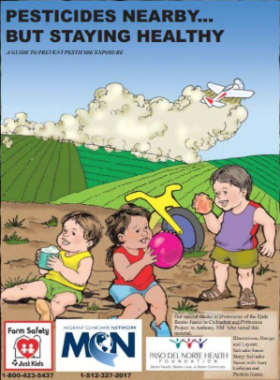Farmworker Women's Health Week
Celebrated from May 11 to May 17, 2025, Farmworker Women’s Health Week aims to increase awareness and understanding of the health risks farmworker women face, and how these risks can extend to their families.
What Are the Primary Health and Safety Risks for Employees on Produce Farms?
EFI’s Standards include indicators to protect worker health and safety. Many national and state laws require employers to evaluate risks and improve systems to reduce illness and injury.
EFI remains committed to promoting safe and healthy working conditions across the agricultural sector. By adopting comprehensive protection and safety practices, employers can not only protect their workers but also enhance their reputation as employers of choice, fostering a positive and productive work environment.
Let’s Dive Deeper Into Some of These Risks
Pesticide Exposure:
Farmworkers and especially farmworker women experience unique risks related to the physical demands and environmental exposures related to their work. The primary routes by which pesticides enter the body are ingestion in food, soil, or water; inhalation, through the skin, and through the eyes. Organochlorine pesticides are absorbed through the lungs, stomach and skin, and excreted only slowly, sometimes over a period of years¹.
Pesticides and Pregnancy: The Migrant Clinician website explores that occupational risk can also be transferred to women from family members through secondhand exposure to chemicals and through location of housing close to agricultural fields². Being in contact with pesticides may lead to miscarriages, preterm births, low birth weight, birth defects and learning problems in children. Taking precautions is vital. Often pesticide exposure can happen in the first weeks before a woman realizes she’s pregnant and those first weeks are the most dangerous time for exposure.
Pesticide Protection:
Even though we strive for a world without harmful pesticides and chemicals, the reality is that many agricultural workers handle these substances daily. Our first step toward a healthier future should be ensuring their protection—by advocating for better safety measures, training, and alternatives that prioritize their well-being while we work toward long-term solutions. The following are some recommendations from Iowa State University³:
- Ensure that workers do not clean, repair, or adjust pesticide application equipment unless they have been trained as a pesticide handler.
- Ensure that all handlers are at least 18 years old.
- Inform handlers of all required label and application information.
- Instruct all handlers how to safely use equipment for mixing, loading, transferring, or applying of pesticides.
- Provide and maintain any required personal protective equipment.
- Provide handlers with respirator training, a medical evaluation, and a fit test if they are required to wear a respirator by the pesticide label.
- During applications, keep workers out of the Application Exclusion Zone and the treated area.
- After work, remove work clothes and shoes before entering the home
- Shower or bath upon returning home and before touching other people
- Store and launder dirty work clothes separately from other clothing
Repetitive Motion Injuries (RMI):
In the context of farmwork, this could include injuries from repetitive tasks like harvesting, lifting, bending or packing. Over time, these movements can lead to pain, inflammation, and damage to the muscles, nerves, and tendons, especially if proper ergonomics or breaks aren’t practiced. Visit the Upper Midwest Agricultural Safety and Health Center (UMASH) website for resources that include a consideration into ergonomics, yoga for farmers and downloadable flyers.
Heat Protection:
In collaboration with agricultural workers, EFI has developed a comprehensive set of resources and tools aimed at supporting and promoting farmworkers’ safety during the heat season. These resources and tools are designed to enhance workplace safety and health in the agricultural industry. This toolkit includes steps to stay sun protected and heat safe, and downloadable fliers.
Stress and Mental Health:
Mental health encompasses our emotional, psychological and social well-being, influencing our thoughts, feelings and behaviors. While we all experience fluctuations in mental health over time, persistent challenges that disrupt daily functioning, like work or relationships, signal the need for extra support and attention. EFI’s toolkit includes social media posts, steps to recognized if someone needs help, a webinar about leading into a trauma-approached context and handouts.
If you or someone you know is struggling, call or text 833-897-2474 | (ES) Si tú o alguien que conoces tiene dificultades, llama o envía un mensaje de texto al 833-897-2474
Preventing Sexual Harassment:
According to the California Department of Fair Employment and Housing, the single most important factor in predicting sexual harassment is the organizational climate of the workplace. Workplaces that promote cultures of respect are less likely to have sexual harassment occur. In this section, we are including EFI’s toolkit access and the BASTA YA! Toolkit designed by University of Washington and agricultural workers. These toolkits includes training videos, trainer’s guide, model workplace policies and procedures, posters and other key resources.
Citations
1- Reproductive Health Effects of Pesticide Exposure, Farmworker Justice and Migrant Clinicians Network. Accessed via https://www.migrantclinician.org/files/repproductive_eng_span_final.pdf on March 28, 2025.
2- Issues in Migrant Health, Migrant Clinicians Network. Accesed via https://www.migrantclinician.org/explore-issues-migrant-health/womens-health.html on March 28, 2025.
3- What Do Farm Employers Need to Do to Comply with the Worker Protection Standard? Iowa State University. Accessed via https://crops.extension.iastate.edu/post/what-do-farm-employers-need-do-comply-worker-protection-standard on March 28, 2025
4- SPOTLIGHT: Preventing repetitive motion injuries on the farm. Upper Midwest Agricultural Safety and Health Center (UMASH). Accessed via https://umash.umn.edu/spotlight-preventing-repetitive-motion-injuries-on-the-farm/ on March 28, 2025.





